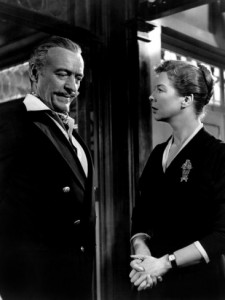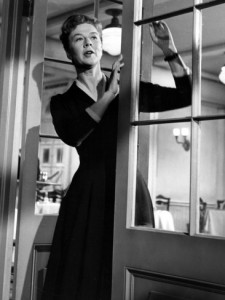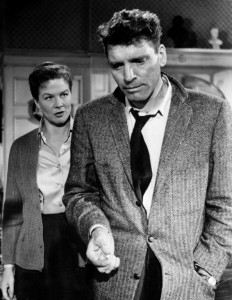Vet British actor David Niven won his first and Only Best Actor Oscar, at his first nomination, for the melodrama, Separate Tables.
Terence Rattigan’s Separate Tables, directed by Delbert Mann from a screenplay by Rattigan and John Gay and the uncredited John Michael Hayes.
The melodrama is set at the Beauregard Private Hotel in the seaside town of Bournemouth. The site could be described as a gathering place of misfits, losers, and rejects of society, run by the good-hearted but stern Miss Pat Cooper (Wendy Hiller in an Oscar-winning performance).
Burt Lancaster, whose company made the film, is miscast as John Malcolm, a self-pitying American writer, drowning the memory of love in drink, hoping to marry his landlady Miss Cooper (Wendy Hiller) and settle down once and for all.
 Another prominent guest is Major Pollock (David Niven), a delusional man who entertains the guests with tales of his days in action in WWII. Prime among his captive audiences are a mousy, terrified girl, Sibyl Railton-Bell (Deborah Kerr), and her tyrannical, sarcastic mother (Gladys Cooper).
Another prominent guest is Major Pollock (David Niven), a delusional man who entertains the guests with tales of his days in action in WWII. Prime among his captive audiences are a mousy, terrified girl, Sibyl Railton-Bell (Deborah Kerr), and her tyrannical, sarcastic mother (Gladys Cooper).
Sybil confides to Major Pollock that she has found a prospective job as a telephone switchboard operator, hoping he will help her persuade her mother who frowns on the idea of her doing any work. Indeed, the domineering mother relentlessly preys upon her daughter’s fears and inhibitions, constantly reminding her of her overwrought spells, which reduce Sybil to further hysterics.
Completely cowed, Sybil has been following her mother’s orders to the word. To all the others, though, it is evident the mother is draining the life and energy of her girl. The mother bitterly resents Sybil’s friendship with the Major, running him down at every occasion. She warns her daughter that everybody in the hotel is watching and talking about his romantic pursuits, knowing that Sibyl is horrified at the very thought of gossip.
 Rita Hayworth plays the second dramatic catalyst, Ann Shankland, Lancaster’s former wife, a movie star who arrives to reclaim him in the name of true love. Malcolm had proposed marriage to Miss Cooper who loves him devotedly, but she lives in dread of the day that the woman Malcolm has talked about from his past will reappear to charm him. Miss Cooper is everything that Ann is not–efficient, kind, reserved, and not particularly alluring.
Rita Hayworth plays the second dramatic catalyst, Ann Shankland, Lancaster’s former wife, a movie star who arrives to reclaim him in the name of true love. Malcolm had proposed marriage to Miss Cooper who loves him devotedly, but she lives in dread of the day that the woman Malcolm has talked about from his past will reappear to charm him. Miss Cooper is everything that Ann is not–efficient, kind, reserved, and not particularly alluring.
Mrs. Railton-Bell brings the relatively quiet atmosphere to a boil, when she noses out a report in the local paper, which reveals that the Major had been arrested for molesting women in a local movie house. She gets her opportunity for revenge on the Major, when she discovers the Major trying to surreptitiously take the copy of the local West Hampshire Weekly News Suspicious, she studies the newspaper closely and calling the others, she reads aloud with satisfaction the story the Major has been so desperately trying to hide. It reports that the day before, he had been arrested in a neighboring cinema for molesting women. The story also reveals that he has been lying about his army and public school background that he has so steadily been bragging about
The mother autocratically instigated a vote among the guests regarding the Major departure, but only Malcolm and another person resist her authority. She cruelly hands the newspaper to Sibyl, who is crushed by what she reads there. Malcolm unsuccessfully tries to rouse Sibyl to make a stand against her mother. Instead, the tormented girl suffers another of her spells, and is dragged away by the exultant mother.
 Later on, Sibyl faces the Major, disclosing that she and the others know what there is to know about him. The Major and girl try to explain their weaknesses. Each finds strength with the other, an understanding.
Later on, Sibyl faces the Major, disclosing that she and the others know what there is to know about him. The Major and girl try to explain their weaknesses. Each finds strength with the other, an understanding.
In the end, the Major decides to face the guests head-on, while Sybil rebels against her domineering mother in a manner that recalls the confrontation between Bette Davis and her mother (also played by Gladys Cooper) in Now, Voyager, except that that melodrama was made in 1942. The Major decides to stay and not run away, and when he appears for breakfast, after the storm, the others greet him nicely. In contrast, Mrs. Railton-Bell is a broken woman when she leaves by herself.
Oscar Nominations: 7
Picture, produced by Harold Hecht
Screenplay (Adapted): Terrence Rattign, John Gay
Cinematography (b/w): Charles Lang, Jr.
Actor: David Niven
Actress: Deborah Kerr
Supporting Actress: Wendy Hiller
Scoring of a Dramatic or Comedy Picture: David Raksin
Oscar Awards: 2
Actor
Supporting Actress
Oscar Context
In 1958, the old-fashioned melodrama “Separate Tables” competed with four other films for the Best Picture: the musical “Auntie Mame,” the screen version of Tennessee Williams’s “Cat on a Hot Tin Roof,” Stanley Kramer’s “The Defiant Ones” (arguably his greatest directorial achievement), Minnelli’s musical “Gigi,” which swept most of the Oscars (including Best Director).
David Niven won Best Actor for “Separate Tables,” and Susan Hayward Best Actress for “I Want to Live!” Having been nominated once before (as Best Actress for “Pygmalion”), Wendy Hiller won the Supporting Actress Oscar. Burl Ives, who was not nominated for “Cat on a Hot Tin Roof,” received a nomination and won for playing another patriarch, in “The Big Country.” The feeling in the industry was that Ives won the Supporting Actor for both films.
The Cinematography Oscar went to Sam Levitt for “The Defiant Ones,” and the Adapted Screenplay to Alan Jay Lerner for “Gigi.” The Scoring Oscar honored vet composer Dimitri Tiomkin for “The Old Man and the Sea.”










